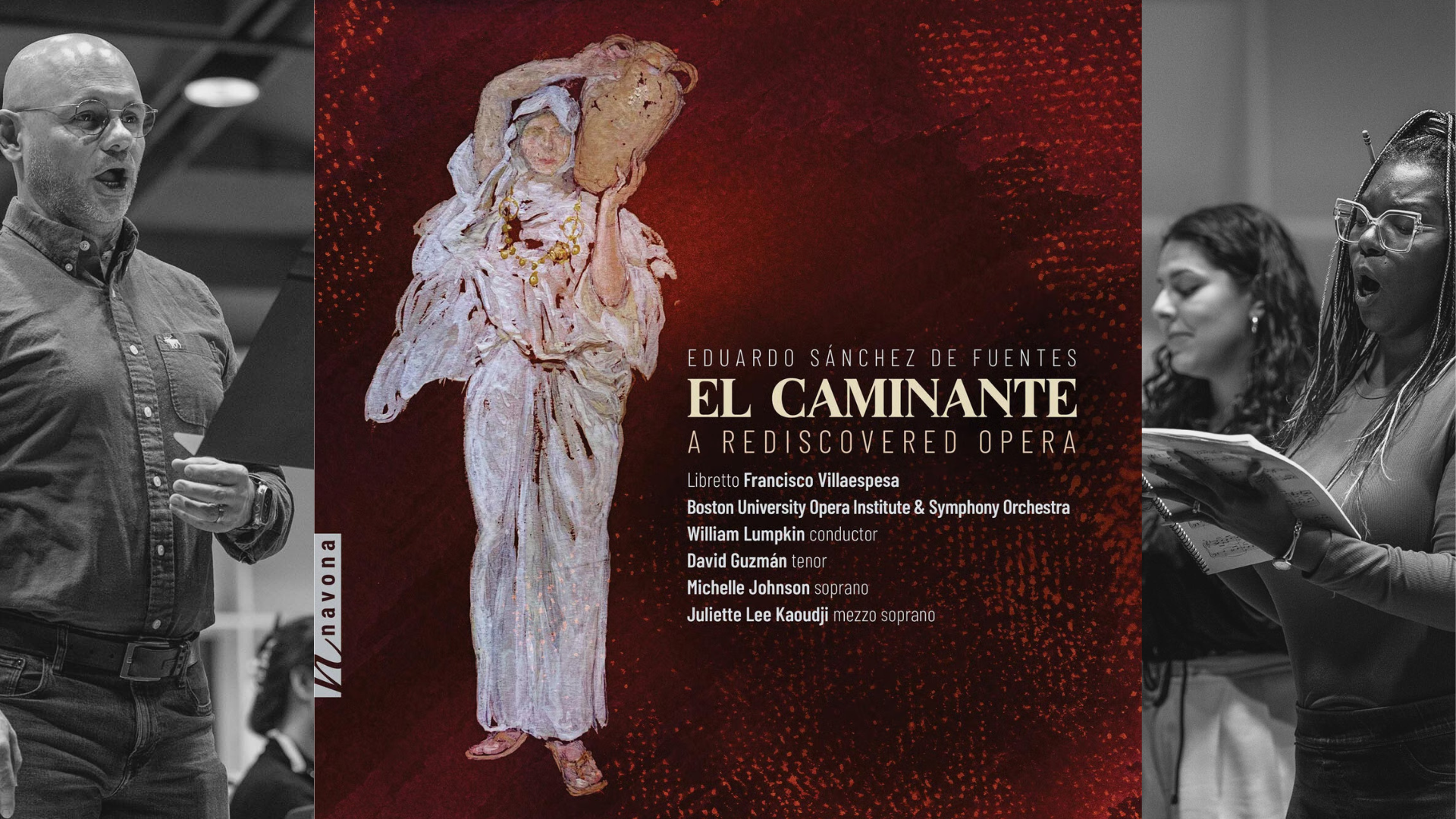Boston University School of Music: Opera Institute’s Recording of El Caminante Released on PARMA’s GRAMMY®-winning Navona Records Label
Navona Records' newest release, El Caminante, a rediscovered Cuban opera that had its world (re)premiere at BU, is available to stream/buy on August 22.

Boston University School of Music: Opera Institute’s Recording of El Caminante Released on PARMA’s GRAMMY®-winning Navona Records Label
Navona Records’ newest release, El Caminante, a rediscovered Cuban opera that had its world (re)premiere at BU, is available to stream/buy on August 22.
Boston University College of Fine Arts School of Music: Opera Institute proudly announces the official release and new recording of El Caminante through PARMA’s GRAMMY®-winning Navona Records Label. El Caminante, a long-forgotten Cuban opera by composer Eduardo Sánchez de Fuentes that first premiered in 1921, was rediscovered after 100 years by David Guzmán, assistant professor of music, voice at BU School of Music. A century later, the opera had its world (re)premiere this past fall at Boston University’s Tsai Performance Center, with a concert-style performance by the BU Symphony Orchestra, members of the BU Opera Institute, and acclaimed soprano and BU alum Michelle Johnson (CFA’07).
“The recording of El Caminante marks a pivotal moment in expanding the visibility and appreciation of Spanish-language operas on the global stage,” says Guzmán, who, besides discovering the long-lost opera, sings the title tenor role. “Like the other five operas by Eduardo Sánchez de Fuentes, El Caminante represents a missing link in the evolution of Latin American opera—a rich legacy that has long remained underrepresented in the broader operatic narrative.”
El Caminante tells the story of a girl, Yolanda, and her mother, Ginesa, both devout Catholics. Yolanda has lost the ability to walk, and her mother spends her days searching for help for her daughter’s condition. Yolanda dreams of a mysterious stranger coming to heal her, and one is sent to Yolanda and her mother in the form of a caminante, who comes to them seeking water for his journey. Struck by Yolanda’s beauty, the caminante embraces and kisses her. Suddenly, she realizes that she can walk again—and that the caminante was the stranger she was dreaming about all along. The caminante leaves, and the opera ends.
“The story of El Caminante is both universal and timeless,” says Guzmán. “Although it was written in the early 20th century, its themes remain profoundly relevant today. At its heart, the opera explores the relationship between our emotions, self-acceptance, and the body’s capacity to heal.”
For Guzmán, who uncovered the piano-vocal manuscript at the Loeb Music Library at Harvard University in 2020, and three years later obtained the orchestral manuscript from the Museo Nacional de la Música in Havana, Cuba, this experience has been deeply personal and a transformative journey.
“It’s almost surreal to reflect on how [this] all began—when I first discovered the existence of this opera at the New York Public Library for the Performing Arts in the fall of 2017. From that moment, I began following every clue I could find to learn more,” says Guzmán, who, as a Latino artist, felt a personal connection performing the opera in his native language. “El Caminante has touched me in profound and personal ways, beginning first and foremost with how it has shaped my growth as a scholar. This long journey—tracing manuscripts, uncovering historical context, and piecing together a forgotten legacy—has felt like unearthing a hidden treasure. To know that I am contributing a small piece to the recovery and appreciation of Latin American musical heritage is both humbling and deeply fulfilling. It’s a reminder of how much beauty and meaning still lies beneath the surface of our collective memory, waiting to be rediscovered.”
According to Guzmán, the premiere of El Caminante in the early 20th century was a success, but a number of historical and economic factors prevented the work from gaining long-term visibility. “The aftermath of World War I (1914–1918), the global economic instability that followed, and later World War II (1939–1945) created difficult conditions for the performing arts worldwide,” explained Guzmán. “In Cuba, these challenges were compounded by the bankruptcy of the opera’s original producer and broader economic hardship, making it nearly impossible to sustain large-scale productions of this kind.” As a result, El Caminante was only performed once more after its premiere and then faded into obscurity.

El Caminante
Eduardo Sánchez de Fuentes • composer
Francisco Villaespesa • libretto
Boston University Opera Institute & Symphony Orchestra
William Lumpkin • conductor
David Guzmán • tenor
Michelle Johnson • soprano
Juliette Lee Kaoudji • mezzo soprano
What if salvation were only a passing shadow? With EL CAMINANTE, the Boston University Opera Institute unearths a one-act operatic gem by Cuban composer Eduardo Sánchez de Fuentes: a microcosm where the boundary between miracle and mirage dissolves into incense and silk. A paraplegic girl is touched – and healed – by a dazzling stranger who promises everything, then vanishes like dew at sunrise. The languid music drapes the seduction in an ambiguous glow, suspended between impulse and sublime transfiguration. Under the baton of William Lumpkin, this early 20th century work is given new life and reintroduced as an essential chapter in Latin American musical heritage — one that deserves to be heard, studied, and performed.
El Caminante was brought to life at BU with the help of CFA faculty: William Lumpkin, associate professor of music and the artistic director and conductor of BU’s Opera Institute; Allison Voth, associate professor of music and principal coach for the Opera Institute; Matthew Larson, senior lecturer, vocal coaching; and Oshin Gregorian, managing director of the Opera Institute and CFA’s opera programs.
“It is an honor to be part of an artistic project that is a result of the kind of research that is at the core of Boston University’s mission and values that my esteemed colleague, Professor Guzman, brought to us,” says Lumpkin. “For me, one of the most memorable and moving moments was when all of us gathered to play the opera with the orchestra and singers together for the first time. The thought that we were able to experience this opera after it had been dormant for over a century could not escape my mind, and I still think about that today.”
For Lumpkin, the El Caminante project also reflects the mission and training of the BU Opera Institute. “We pride ourselves in programming and presenting a combination of new or unknown repertoire along with more standard and well-known pieces, which provides our students a wide swath of experiences in many styles,” explains Lumpkin.
Guzmán adds, “This recording of El Caminante beautifully reflects the mission and training of the BU Opera Institute. At the core of this project is a commitment to excellence, innovation, and real-world artistic exploration—values that are deeply embedded in BU’s educational vision. Our students had a rare and invaluable opportunity to engage directly with a living research and performance process: the revival of a forgotten Latin American opera from manuscript to stage.”
The concert-style performance (not a staged dramatic production) of El Caminante this past fall featured Boston University’s Symphony Orchestra, conducted by Lumpkin, and Opera Institute students singing the ensemble parts. Guzmán sang the titular tenor role, with CFA alum and opera star Michelle Johnson (CFA’07) as Yolanda (lead soprano) and performance diploma student Juliette Kaoudji (CFA’26) as Ginesa (mezzo-soprano).
“I’m truly honored to have been chosen to participate in such a meaningful and exciting project. To take on a rediscovered masterpiece is challenging in that one has the opportunity to explore and put their own stamp on a character without any roadmaps to follow,” says Johnson, who credits BU Opera Institute and her voice teacher, Penelope Bitzas, for helping her expand her creative talents, and who continues to use the tools she learned at BU every time she performs. “To be a part of the rebirth of El Caminante is a treat. I’m proud of the work that was put into this project, and I look forward to the world’s reaction to such a luscious score. Here’s to El Caminante‘s long life!”
The recording of the rediscovered Cuban opera will be available to stream/buy on August 22, 2025. El Caminante also has more plans in the future.
“Since 2023, I have been collaborating with the Instituto Complutense de Ciencias Musicales (ICCMU) at the Universidad Complutense de Madrid, an institution whose mission is to recover, study, and promote forgotten works from the Hispanic musical heritage,” says Guzmán. “Both the piano-vocal score and the orchestral score of El Caminante are under contract to be published by ICCMU, with a planned release in November 2025. This forthcoming edition represents a major step toward bringing El Caminante back into public and scholarly visibility, ensuring its accessibility for future performers, musicologists, and cultural institutions.”
“To bring this opera to light more than a century later is not only a cultural rediscovery—it is a tribute to its long-overlooked place in the Spanish-language operatic tradition. I hope the story and music evoke a sense of reflection and emotional connection in listeners. I want the audience to see parts of themselves in the characters—to consider their own journey toward self-acceptance and recognize the importance of the love and support that exists within their close relationships. My hope is that El Caminante engages people not only intellectually, but emotionally, guiding them toward a deeper understanding of their inner life and the people who walk beside them.”
view streaming/buying options for el caminante
ARTIST INFO




CFA: What does the recording of El Caminante mean for the visibility and appreciation of Spanish operas globally?
Guzmán: Although composed in Spanish, El Caminante is more closely aligned with Romantic Italian opera than with Spanish zarzuela, reflecting the stylistic influence of composers such as Verdi and Puccini.
This new recording offers a meaningful opportunity to reintroduce the opera to modern audiences. It invites listeners and scholars to rediscover the expressive depth of Spanish-language opera and to enrich the operatic repertoire with new perspectives.
By studying and performing this music, we open pathways to a fuller and more inclusive understanding of opera’s global heritage. This revival is not only a celebration of artistic legacy but also a hopeful step toward a more vibrant and diverse future for the art form.
How has El Caminante touched you personally? Can you share how its story, music resonated with you?
Singing the title role has also been incredibly meaningful. Knowing that the role was originally premiered by the legendary Italian tenor Tito Schipa, I felt as though I was walking in his footsteps—honoring a legacy while bringing new life to this character nearly a century later.
Through the character study process, I discovered that what first appears to be a simple love story holds something far more profound. El Caminante is not merely a romantic figure—he is the personification of love itself, the force that allows Yolanda to heal. That realization gave my performance emotional and spiritual depth that deeply resonated with me.
As a Latino artist, singing this expressive and beautifully crafted music felt like a homecoming. It was a celebration of identity, heritage, and the enduring power of art to heal, uplift, and bring forgotten voices back into the light.
How does this recording reflect the mission and training of Boston University School of Music and BU’s Opera Institute? What opportunities has this project presented to music students at Boston University?
Not many institutions are able to put together the team and resources needed to undertake a project of this scale and depth. That’s what makes the BU School of Music and the Opera Institute so distinctive. Our faculty—renowned performers, educators, and scholars—mentor students through every phase of the process, whether they are reviving a century-old opera or premiering a new work.
The cast of the El Caminante recording included outstanding BU talent across generations. Acclaimed BU alumna soprano Michelle Johnson performed the role of Yolanda, and current BU Opera Institute student Juliette Kaudji sang the role of Ginesa. Her artistry and commitment reflect the program’s high caliber.
Through the Opera Institute, students experience a dynamic training ground—a laboratory where historical revivals, standard repertoire, and new compositions coexist and thrive. This project has not only launched a forgotten opera back into the world—it has also launched our students into deeper understanding, stronger artistry, and a real-world experience that prepares them for meaningful professional and artistic journeys ahead.
Thank you note from Guzmán:
This project has been both a scholarly quest and a collaborative artistic endeavor. I feel deep appreciation for all of my colleagues who believed in and supported this vision—from Dean Harvey Young to Professors William Lumpkin and Allison Voth. Their encouragement made this journey possible, and the release of El Caminante feels like the culmination of many years of passion, persistence, and shared purpose.
ABOUT US
Founded in 1839, Boston University is an internationally recognized institution of higher education and research. With more than 34,000 students, it is the fourth-largest independent university in the United States. BU consists of 17 schools and colleges, along with a number of multi-disciplinary centers and institutes integral to the University’s research and teaching mission. In 2012, BU joined the Association of American Universities (AAU), a consortium of 62 leading research universities in the United States and Canada. Learn more at bu.edu.
Established in 1954, Boston University College of Fine Arts (CFA) is a community of artist-scholars and scholar-artists who are passionate about the fine and performing arts, committed to diversity and inclusion, and determined to improve the lives of others through art. With programs in Music, Theatre, and Visual Arts, CFA prepares students for a meaningful creative life by developing their intellectual capacity to create art, shift perspective, and think broadly. CFA offers a wide array of undergraduate, graduate, and doctoral programs, as well as a range of online degrees and certificates. Learn more at bu.edu/cfa.
Founded in 1872, the School of Music combines the intimacy and intensity of traditional conservatory-style training with a broad liberal arts education at the undergraduate level, and elective coursework at the graduate level. The school offers degrees in performance, conducting, composition and theory, musicology, music education, and historical performance, as well as Artist and Performance diplomas and a certificate program in its Opera Institute.
The Opera Institute at CFA School of Music is an intensive, highly selective two-year performance-based training program for emerging operatic artists. A professional faculty and renowned guest artists provide personal support and training in all areas pertinent to a career in opera, including voice, acting, languages, and movement styles. Additionally, the Opera Institute also selects undergraduate and graduate singers from the School of Music who demonstrate true operatic potential and have mastered an intermediate integration of acting, vocal, and movement skills for the Opera Theater, Opera Workshop, and Opera Project programs. More at bu.edu/cfa/opera.